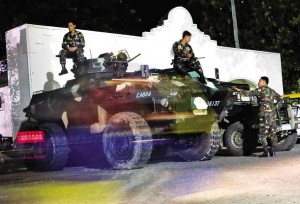This business of fixing Abra

ELECTION DAY in Abra features the familiar presence of military vehicles and heavily armed soldiers and policemen. An armored personnel carrier was stationed at the Abra capitol on Monday night to stop losing politicians and their supporters from disrupting the canvassing of votes. EV ESPIRITU
A bullet-riddled man whom Jose Galera found outside his house in Barangay (village) Sagap in Bangued, Abra, on Monday, Election Day, is a mystery that needs solving.
For the moment, though, the man, Jenario Martinez, 31, was the only Abra fatality in the May 13 elections, and that was reason for some back-patting in the province.
In the months leading to the polls, the government had been driven by a compulsion to fix Abra, one of the areas of concern because of its history of election violence.
Abra (155,561 voters in 27 towns) was served on Monday by 341 precinct count optical scan (PCOS) machines. The biggest voting population is in the capital Bangued, with 25,565 voters.
The police had been partly blamed for the province’s notoriety. In 2005, the Abra police force was replaced because of a government investigation that discovered some lawmen moonlighting as bodyguards of politicians.
Article continues after this advertisementThe discovery led to the government’s campaign against private armed groups, which hired themselves out to feuding political families.
Article continues after this advertisementKeeping Abra elections peaceful so that it no longer needed to be placed under the control of the Commission on Elections became a police agenda, said Chief Supt. Benjamin Magalong, Cordillera police director.
Bangued is a town that fears its own shadow. On election day, all shops were closed to allow people to cast their votes. However, some store owners said closing shop also protected them and their employees from political violence.
The violence rarely takes place, police said. Many of the province’s politicians thrive on horror stories to maintain their reputation, which keeps each other in check.
But law enforcers used to provide a balance that was lost when the 2005 fact-finding report became public.
The Cordillera police staged conflict resolution sessions with feuding political families, acting like therapists while politicians vented and ranted against each other.
On Monday, the police kept heavy artillery away from public eye and the rain appeared to have kept tempers down as voters trooped to their polling places.
Except for reports of gun firing, the discovery of metal spikes strewn on roads in Bangued and Lagayan town and a tense faceoff between two rival candidates, the May 13 polls here were uneventful, Magalong said.
He said they toured the province to show people they would respond to every complaint, no matter how trivial, to prove that Abra political
reforms worked.
Carmelita Bersalona, convenor of an Abra peace initiative, said the police objective of rebuilding bridges with the community has been important to local campaigns that introduce future voters to the world of politics.
Collaboration, honesty and transparency are new ingredients to governance that Abra leaders are being asked to adapt, she said, adding that youth leaders have been asked to immerse themselves in the elections to see how the exercise could change the province.
But to be empowered and to be courageous, voters need to know that agencies, like the police, are protecting them, she said.
It helped that the notoriety that kept politicians in office has drawn the attention of the government and the media, she said. Almost every news organization in the country deployed reporters to the province.
“The attention has pricked the collective ego of Abra. We don’t want this stereotype. We want the country to see we are a different Abra,” Bersalona said.
Election reform groups have also been active in Abra before election day.
The Concerned Citizens of Abra for Good Governance (CCAGG) recently mounted a social experiment in Peñarrubia town.
Politicians and voters were urged to “use indigenous forms of communication and teaching strategies … to elicit the voters’ aspirations and desires,” which would be expressed to aspiring leaders who court their votes, Pura Sumangil, CCAGG chair, said.
The undertaking was organized by CCAGG, the Transparency and Accountability Network (TAN), the University of the Philippines National College of Public Administration and Governance (UP-NCPAG) and the De La Salle University-Jessie M. Robredo School of Governance.
Sumangil said one aspect of the project involved dialogue, which “encouraged the people to say what they want for their communities more than what the candidates want for them.”
“The candidates cannot dictate what they want for the people, because it is the people who will put them in office,” she said. With reports from Desiree Caluza